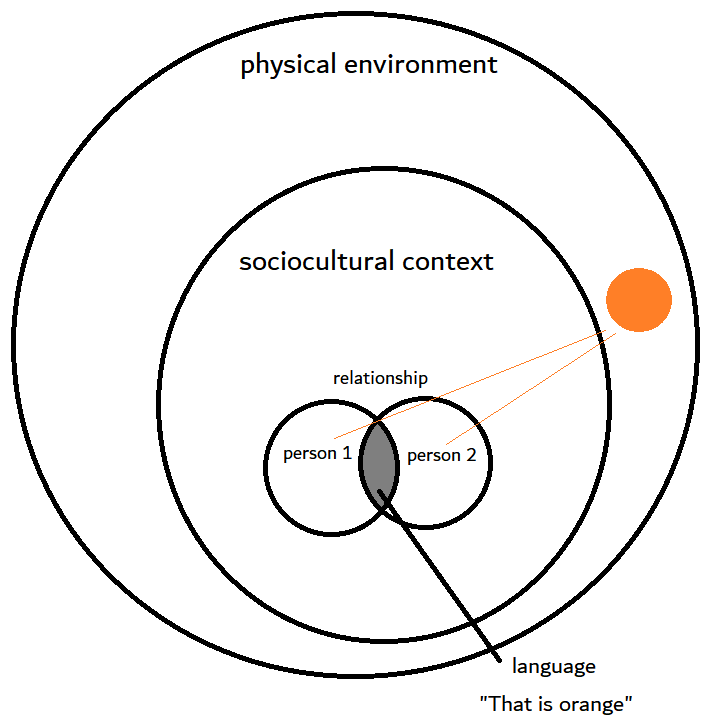It wasn’t until recently that I realized I failed to add an important concept to the discussion on Rosen and the incompleteness of syntax. I’m actually quite annoyed and embarrassed by this because the idea was included in the presentation. It didn’t make it into the written version because I forgot about it and failed to reread the slides to see if anything was missing. If I had, I would have seen the examples and remembered to add it to the written piece.
In semantics, there are words with specific properties called indexicals. These words refer to things that are dependent on context, such as the time, place, or situation in which they are said.1 Some examples include:
- this, that, those
- I, you, they, he, she
- today, yesterday, tomorrow, last year
- here, there, then
Rosen would likely agree to the idea that indexicals are non-fractionable, where their function, or task they perform, cannot be isolated from the form in which they exist. The reason indexicals are non-fractionable is because they must be interpreted by a mind to know what someone is referring to. To accomplish this, sufficient knowledge or understanding of the current context is required, as without it, the statement remains ambiguous or meaningless. If I say “He is late” you must be able to discern who it is I am referring to.
Indexicals act like variables in a math equation: an input value must be provided to determine the output. In the case of language, the output is either true or false, and the input value is an implicit reference which requires another to make an inference about what the other has in mind. This inference is what establishes the connection between utterance and referent, only existing in the mind of another person rather than within the language system itself.
Thus, we are dealing with a few nested natural systems, from language, to body/mind, to interpersonal, to cultural and environmental. To evaluate a linguistic expression, however, one must know about the wider context in which they are in, traversing the systems both outward and inward. Perhaps a diagram will help:

Recall that in Anticipatory Systems, Rosen appeals to Gödel to demonstrate the limitations of formal systems. Particularly, formal systems cannot represent elements from natural systems which extend beyond the scope of its existing functionality; to do so requires further modelling from natural systems to formal systems. Therefore, any AI which uses computer code cannot infer beyond the scope of its programming, no matter how many connections are created, as some inferences require access to information which cannot be adequately represented by the system. Because language contains semantics, references to aspects of the world can be made by humans which cannot be interpreted by digital computer.
In an interesting series of events, I stumbled upon an author who also appeals to Gödel’s theorem to argue for the incompleteness of syntax with respect to semantics.2 In a book chapter titled Complementarity in Language, Lars Löfgren is interested in demonstrating how languages cannot be broken up into parts or components, and as such, must be considered as a process which entails both description and interpretation.3 On the other hand, artificial languages, which he also calls metalanguages, can be fragmented into components, however, they are still reliant on semantics to a degree. He states that in artificial languages, an inference acts as a production rule and is interpreted as a “real act of producing another sentence”4 which is presumably beyond the abilities of the formal system doing the interpreting. I say this because Löfgren finishes the section on Gödel abruptly without explaining this further, and goes on to discuss self-reference in mathematics. So with this in mind, let us return to the domain of minds and systems.
In language, self-reference can be generated through the use of indexicals such as ‘I’ or ‘my’ or ‘me’. When we investigate what exists at the end of this arrow, we find it points toward ourselves as a collection of perceptions, memories, thoughts, and other internal phenomena. The referent on the end of this arrow, however, isa subjective perspective. For an objective perspective of ourselves, we must be shown a reflected image ourselves from a new point of view. The information we require emerges from an independent observer, a mind with its own perspective. When we engage with this perspective, we become better able to understand what is otherwise imperceptible. Therefore, self-awareness is a problem for any system, not just formal systems as demonstrated in Gödel’s theorem, as it requires a view from outside to define the semantic information in question.

Works Cited
1 David Braun, ‘Indexicals’, in The Stanford Encyclopedia of Philosophy, ed. Edward N. Zalta, Summer 2017 (Metaphysics Research Lab, Stanford University, 2017), https://plato.stanford.edu/archives/sum2017/entries/indexicals/.
2 Lars Löfgren, ‘Complementarity in Language; Toward a General Understanding’, in Nature, Cognition and System II: Current Systems-Scientific Research on Natural and Cognitive Systems Volume 2: On Complementarity and Beyond, ed. Marc E. Carvallo, Theory and Decision Library (Dordrecht: Springer Netherlands, 1992), 131–32, https://doi.org/10.1007/978-94-011-2779-0_8.
3 Löfgren, 113.
4 Löfgren, 133.